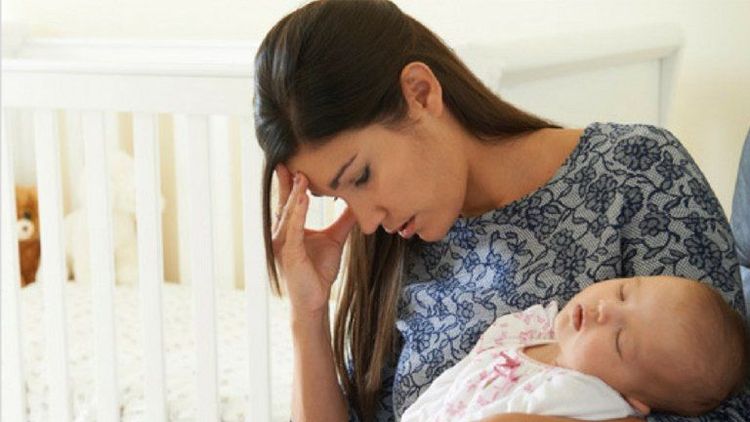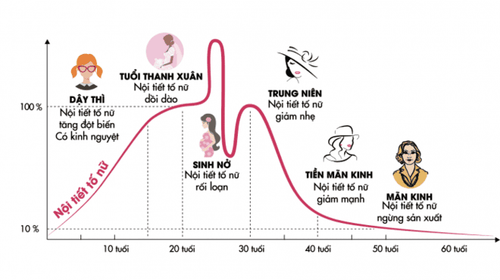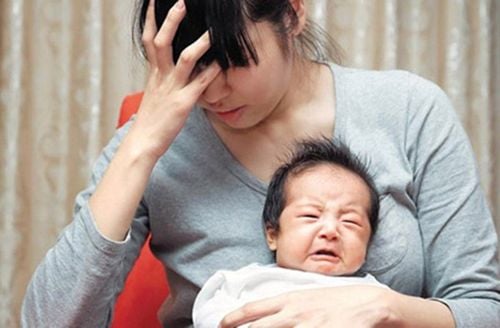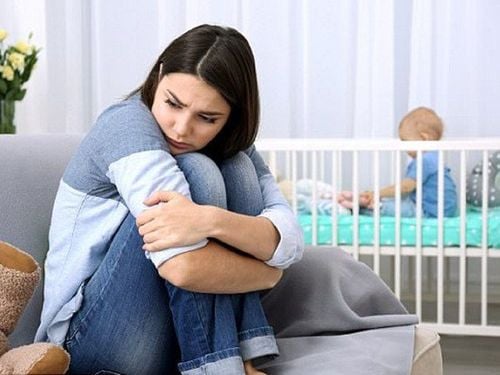This is an automatically translated article.
The article was professionally consulted by Specialist Doctor II Tran Thi Mai Huong - Department of Obstetrics and Gynecology - Vinmec Hai Phong International General HospitalPostpartum women's psychology is affected, combining many factors that cause postpartum depression. If not detected and properly psychologically treated, postpartum depression can have unfortunate and life-threatening consequences for both mother and child.
1. What is postpartum depression?
Postpartum depression is a condition associated with thoughts and feelings of fatigue, sadness, anxiety, and hopelessness that appear after giving birth. Postpartum depression can be mild, moderate, or severe, and can be transient or persistent. The disease can be detected early, treated and, in some cases, prevented.2. Signs of postpartum depression
Women with the following symptoms should immediately think of postpartum depression:Feeling sad, even don't know why sad, hopeless, empty, or overwhelmed about everything around. Crying often, crying more than usual, not even knowing why. Always feeling scared, scared. Sadness, irritability, restlessness. Falling into a state of insomnia, unable to sleep peacefully, or sleeping too much. Difficulty concentrating, losing concentration, making decisions. Angry, out of control. Don't care about yourself, don't have the same hobbies as before. Pain both physically and mentally, headache, stomachache, muscle pain, fatigue. Eat too little, do not want to eat, in some cases eat a lot. Fear of contact with others, alienation from relatives and friends, even unwillingness to be close to children. Do not trust the ability to protect, protect and nurture children. Thoughts of harming yourself and your baby appear. MORE: How are hormones related to postpartum depression?

3. What causes postpartum depression?
The main cause of postpartum depression in women is still unknown. Because this is a psychological sign, each person will have different causes and some people have it, some people don't. This symptom is a combination of many factors, from mental, physical, and psychological causes. 5 causes can be named below:Changes in hormone levels in the body: In the first hours after giving birth, estrogen and progesterone levels in the body drop sharply, which can lead to depression. . This is similar to stress and mood swings as hormone levels change slightly before each menstrual cycle.

Have a history of depression: Women who suffered from depression before, during or after pregnancy, or who are being treated for depression have a higher risk of developing postpartum depression than the general population. Emotional factors: Unplanned or unwanted pregnancy can affect a mother's emotions during pregnancy. Even with a planned pregnancy, some women take a long time to adjust to having a baby. In addition, when the baby has health problems or has to be treated for a long time in the hospital, the mother may experience emotions such as sadness, anger, and guilt. These are emotions that affect self-confidence and put pressure on the mother. Fatigue: Many women feel extremely tired after giving birth, it takes them weeks to regain strength and energy. In women who give birth by cesarean section, the recovery time can be even longer. Life factors: Lack of help from relatives. Experiencing a stressful event, such as the death of a loved one, illness in a family member, or a change of residence, are also factors that increase the risk of postpartum depression.
4. Subjects prone to postpartum depression
People with a history of postpartum depression, the risk of recurrence is 50%. History of depression outside of pregnancy, 25% risk of postpartum depression. Stop taking antidepressants during pregnancy, 68% fall into a state of depression, if continuing to take the drug, 25% become depressed. Are under the age of 18. Have experienced stressful events in the past: illness, infertility, unemployment. Lack of help, sympathy and sharing from relatives, especially the husband Husband and wife conflict, conflict with mother-in-law. Unwanted pregnancy Pregnancy complications: stillbirth, miscarriage. Depression is more likely to occur in children, but it can still occur in chickens. SEE ALSO: Overcoming postpartum depression: What you need to know5. How to overcome postpartum depression
Postpartum depression can be completely treated with good results if it is started early. Mental health professionals can help mothers after giving birth to have the most appropriate and correct treatment for depression. Some of these methods may include:Psychological counseling Postpartum depression mothers will talk privately with a mental health professional or psychologist. Doctors can use cognitive behavioral therapy, which helps patients recognize and change their negative thoughts and behaviors gradually; or interactive therapy means helping people around you understand and support the patient in effective treatment.
Women with mild depression can receive treatment counseling. More severe cases can be treated with counseling and medication.
Drug treatment When a mother thinks she has postpartum depression, she should consult her doctor as soon as possible.
Try to tell the doctor about all the symptoms that cause discomfort, this will help the doctor make a more accurate diagnosis of the disease. Commonly prescribed medications are either sedatives or antidepressants. Antidepressants have an inhibitory effect on the brain, regulating mood.
However, the use of antidepressants should be considered and strictly prescribed by the doctor. If the medication is not effective, or the patient feels uncomfortable, the doctor should consult the doctor to change the medicine or dose. If medication is right for you, don't shorten your treatment, because depression takes a long time to fully recover. If after stopping the drug, the symptoms return, do not despair, should consult a doctor for further advice.
Support from relatives Friends and family need encouragement, support and certainly the mother is being treated for depression. Understand that the illness is in a temporary stage and share and empathize with their feelings and preferences. Family support plays an important role in helping the mother recover quickly.
The role of self Besides treatment methods as well as sharing with loved ones, the mother herself plays a very important role in the recovery process. A mother experiencing depression should trust and be patient in her own ability to improve her depression.
Listen to your body, don't worry too much about pain and fatigue, because pain is a state postpartum mothers can experience, and fatigue is the cause of depression becoming worse. At the same time listen to your feelings, relax and do the things you love.
Take care of your health by eating in moderation, adding fruits and vegetables every day.
It can be said that postpartum depression is curable and not very dependent on the time of diagnosis. Therefore, please pay special attention to postpartum women to limit the risk of depression and unnecessary consequences.
Psychology Clinic - Vinmec International General Hospital officially came into operation in April 2019, has the function of examining, consulting and outpatient treatment of psychological problems and psychological health. With modern equipment, Vinmec Mental Health Clinic is currently cooperating with experienced professors and experts:
MSc. Doctor Nguyen Van Phi - Psychologist, Vinmec Times City International Hospital: with 7 years of experience working as a lecturer in Psychiatry - Hanoi Medical University, Doctor Psychiatrist at Hanoi Medical University Hospital & Central Geriatric Hospital, and a member of the Vietnam Psychiatric Association. MSc. Dr. Pham Thanh Luan - Psychologist, Vinmec Times City International Hospital: with 5 years of experience in research, examination and treatment of Psychiatric diseases, trained at prestigious universities trust, practice in-depth expertise in the French Republic. MSc. Doctor Nguyen Trong Hien - Psychologist, Vinmec Times City International Hospital: with 6 years as a lecturer in the Department of Psychiatry - Hanoi Medical University and Central Geriatric Hospital, together with Dr. Experience in research, examination and treatment of diseases in Psychiatry such as: emotional disorders, stress-related disorders and body dysmorphic disorders, developmental disorders in children, adolescents & childbirth .... Along with the implementation of psychological tests, intensive psychotherapy for diagnosis and treatment, in order to bring the best medical examination and treatment effect.
Please dial HOTLINE for more information or register for an appointment HERE. Download MyVinmec app to make appointments faster and to manage your bookings easily.
Article referenced source: Acog.org













